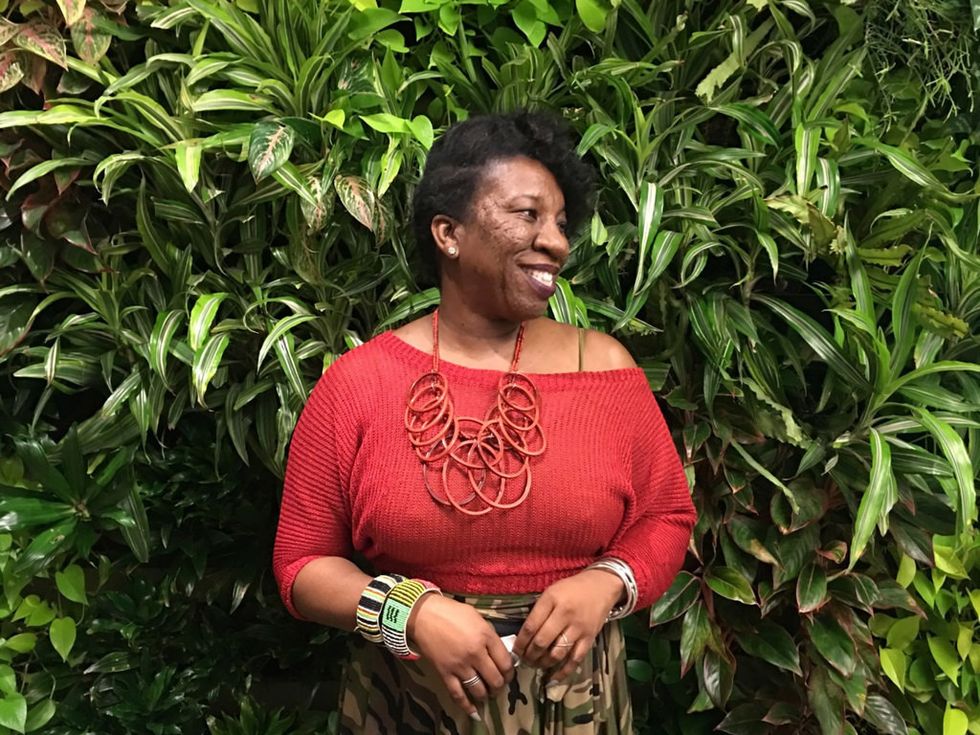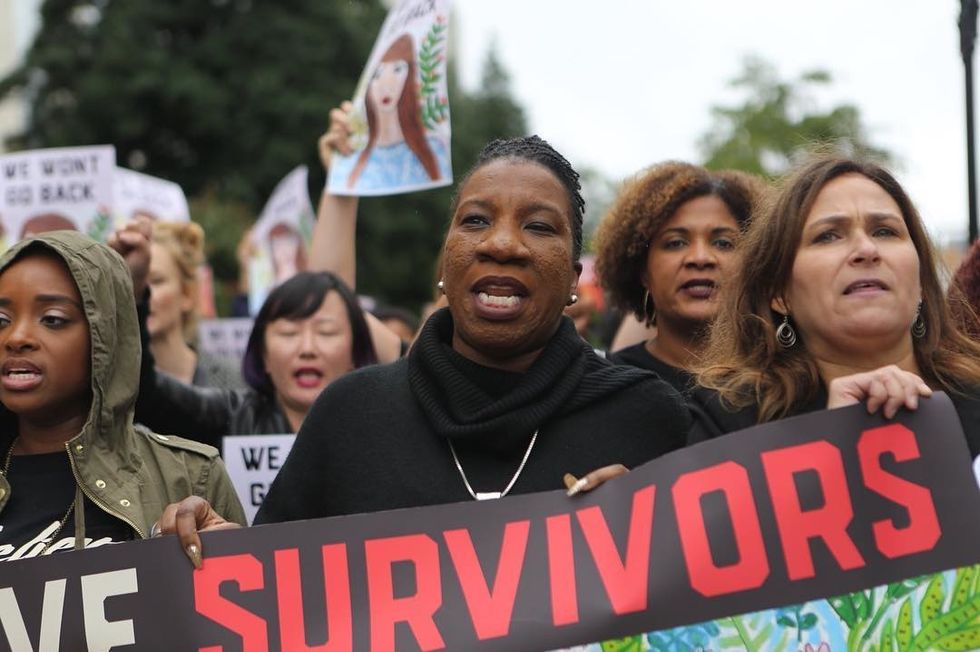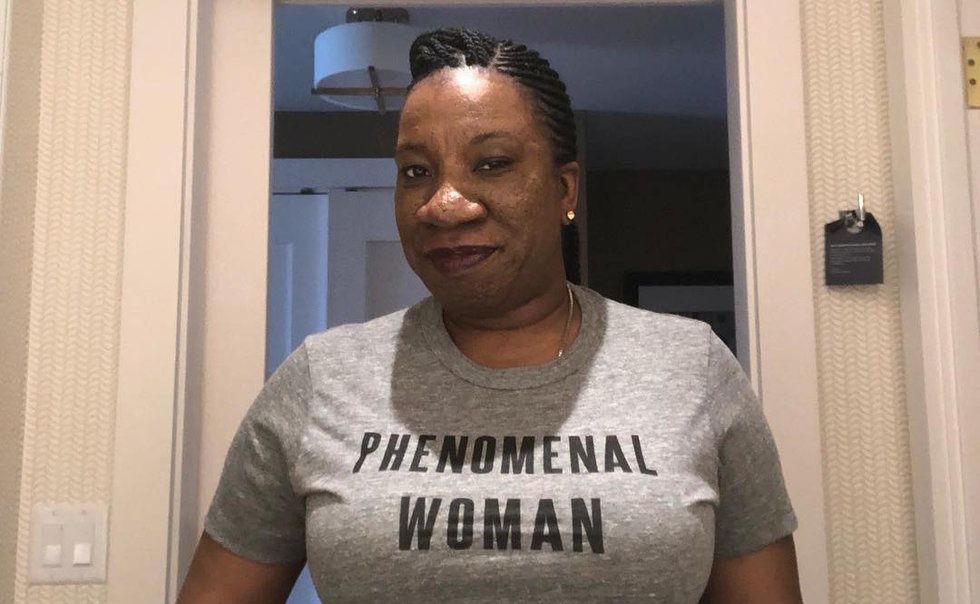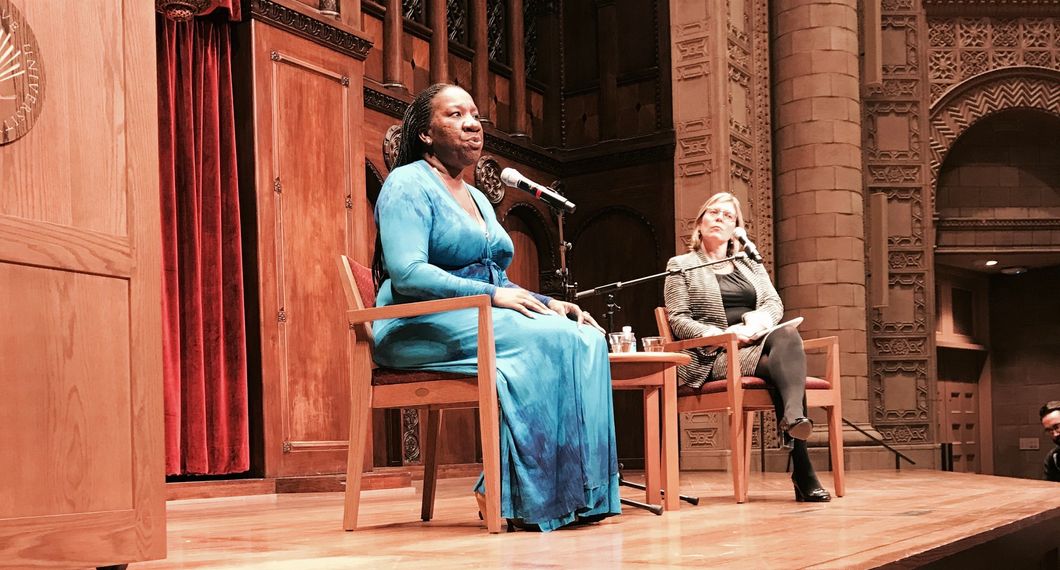Recently I had the opportunity to sit two rows from the stage and hear Tarana Burke, founder of the #MeToo movement, give the most impassioned talk I've heard in a long time.
She was the guest speaker at Case Western Reserve University's Think Forum, held on October 16th. She walked onto the stage with so much grace that you'd never guess she'd experienced so much hurt.
What marveled me most about her entire speech, was that she didn't mention her experience of abuse once. She didn't need to. We all knew about it, and the entire point of her movement is to not focus on the pain of our stories, but to instead focus on healing ourselves and our communities.
Burke founded the #MeToo movement back in 2006, and the phrase began without the hashtag, and without social media in general.
She used these two words as a way to unify survivors. When all other words failed her in comforting survivors of sexual abuse, assault, and harassment, these two words were all she had to give any semblance of hope and solace to those who shared their stories with her.
I sat in awe as she spoke of ally-ship and camaraderie and celebrating the one year anniversary of the #MeToo hashtag going viral on Twitter. Here are some things she said in her talk that stood out to me in the short time I got to hear her speak, and they're things I'll remember forever.
1. "[21st Century Youth Leadership Movement] taught me to focus on the injustice in the world rather than the injustices in my own life."

Burke attended college in Selma, Alabama, and worked with the 21st Century Youth Leadership Movement, a program that works to empower children to create positive change in their communities. It was her that she was taught to focus her rage outward and to injustices like systematic racism, instead of holding that rage strictly against the injustices done to her personally. Burke became a civil rights activist at a young age and let her pain fuel the fire to push for change.
2. "What could someone have said to me at that age to make me feel whole again?"

When she said this, it felt like someone had punched me in the gut. She had just finished telling the story of the first time the words "me too" came to mind after a 12 or 13-year-old girl told her about being sexually abused. She said that she had no words to comfort this child, despite having been in the same situation at that age. She never said the words "me too" to this particular child, but reflecting on the situation later, she realized that those were the only words that would have made sense.
3. "Your life does not have to be the sum total of these circumstances."
A sentiment she touched on again and again throughout her speech was the fact that our pain and our bad experiences do not define us. They do not define the trajectory of our lives, they don't affect our worth, they don't dictate how we have to live the rest of our lives. She emphasized the importance of healing and focusing on life after sexual assault.
4. "You have to take what you have to make what you need."

Specifically, Burke was referring to taking the pain and emotion coupled with the lack of resources for survivors of sexual assault, and turning that into what became the #MeToo movement. She needed a support system and a place to feel understood, and she created that using her experiences. This quote can apply to so many other facets of life, and everyone can benefit from learning the value of our trauma, and how it puts us in a unique situation to create something no one else can, because no two people share the exact same experiences.
5. [The #MeToo movement] is not a culture shift, not yet."
When she said this, I was confused at first, and judging from the looks on the faces around me, I wasn't the only one. In my head, the #MeToo movement was a huge culture shift. Survivors were coming forward, supporting each other, looking out for each other, I thought that was a big win. What Burke explained was that yes, our culture is changing, but only slightly. She explained that we still have a very long way to go. We have a heavy fight ahead of us in protecting the rights of survivors and reprimanding perpetrators. Our culture is changing, but our mindsets towards sexual assault/abuse/harassment haven't shifted in the way we need them to.
6. "People have these pervasive misconceptions that this movement is about taking down powerful men."
A large part of Burke's talk was clarifying what the #MeToo movement is, and what it isn't. It isn't about men in positions of power, it isn't about men being in "danger" of accusations. In fact, it isn't about men at all unless you're talking about male victims of sexual assault/abuse/harassment (and yes, they do exist). The whole focus of this movement is survivors, both male and female. About making them heard, making them feel less alone, and making sure they don't have to live in fear.
7. "We steadily trade on the labor of survivors."
We guilt them into telling their stories. We exploit those stories in the media. We make them relive those stories over and over again each time they're asked what happened to them. We demean their stories when all we talk about is the perpetrators. We call them liars. We ask what they were wearing. We use their pain as leverage. Burke pointed out that even though #MeToo has brought so many stories to the forefront, survivors are often forgotten about. Think about it, can you came any of the women Bill Cosby assaulted? I can't. Because all we hear about is Bill Cosby himself. We see endless coverage of the Harvey Weinstein's and the Bill Cosby's, but the survivors are pushed to the background.
8. "You don't owe the world your story. Some people don't deserve your story."
After her speech, we moved onto the Q&A part of the evening, where audience members got the chance to ask questions. When asked about when the right time is for survivors to tell their story, Burke simply stated that they never have to. Your story is exactly that, yours. It belongs to you. No one else has ownership over those experiences. Burke said that a simple, "Me too," is all you need if you want to acknowledge that you know the pain another survivor is going through, but you are in no way obligated to tell your story because some people don't deserve to hear it.
9. "You can't tell a person how to heal."
Burke said that one of the questions she gets most often is how to come back from an incidence of being sexually abused/assaulted/harassed, and she said that she can't offer a fix-all solution. She said that you can offer support, a shoulder to cry on, you can make suggestions, but ultimately you cannot tell a person how to heal from their trauma.
10. "Raise [your girls] with vigilance, but not fear."
Another question from the audience was along the lines of, "What can we say to our daughters?" Burke’s response was so well thought out and as a mother herself, she encouraged the audience to not walk on eggshells around their children. To teach boys and girls about consent. To teach boys that no means no, and to lead by example. To teach girls to walk a fine line of watching out for themselves and their fellow women, but not to the point of living in constant fear.
After hearing her speak, I owe so much to Tarana Burke. In two and a half hours I learned so much from her about healing, and about supporting survivors, and about the world in general. I left with the fire in me to create change fueled more than I ever thought possible. It made me more confident in pursuing activism and standing up for what's right, and gave me tools to help myself and those around me.
To Tarana Burke, thank you for your endless pursuit of justice, and for educating and inspiring myself and so many other men and women around the world.
















